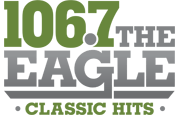KLTH
 | |
| City | Lake Oswego, Oregon |
|---|---|
| Broadcast area | northwestern Oregon and southwest Washington |
| Branding | 106.7 The Eagle |
| Slogan | The Pacific Northwest's Classic Hits |
| Frequency |
106.7 MHz (also on HD Radio) 106.7-2 for 60's Oldies "iHeart 60s" |
| First air date |
September 15, 1972 (as KQIV) August 1, 1977 (as KMJK) |
| Format | Classic Hits |
| ERP | 100,000 watts |
| HAAT | 502 meters |
| Class | C |
| Facility ID | 4115 |
| Transmitter coordinates | 45°30′58″N 122°43′59″W / 45.51611°N 122.73306°WCoordinates: 45°30′58″N 122°43′59″W / 45.51611°N 122.73306°W |
| Callsign meaning | K-LiTe H (former branding) |
| Former callsigns |
KQIV (1972-1976) KMJK (1977-1991) KMXI (1991-1993) KKBK (1993-1994) KKJZ (1994-2002) |
| Owner |
iHeartMedia, Inc. (Citicasters Licenses, Inc.) |
| Sister stations | KKRZ, KKCW, KFBW, KXJM, KPOJ, KEX |
| Webcast | Listen Live |
| Website | 1067theeagle.com |
KLTH (106.7 FM, "The Eagle") is a classic hits formatted radio station located in the Portland, Oregon, area and broadcasts at 106.7 FM. KLTH's studios are located in Tigard, Oregon and its transmitter is located in Portland's west hills. It is currently under ownership of iHeartMedia, Inc..
History
KQIV
See KQIV (defunct)
The station signed on the air on September 15, 1972 as KQIV with a progressive rock format. In 1974, KQIV switched to an urban contemporary format (as "Soul 107"). KQIV went off the air on June 18, 1976.
KMJK
On August 1, 1977 the station signed back on the air as KMJK with a soft rock format (as "The Magic FM"). On June 29, 1979 KMJK changed their format to top 40 (as "Magic 107"). In July 1981, KMJK changed their format back to soft AC (as "Magic 107"). In August 1982, KMJK changed their format again to top 40 (as "Magic 107"). On April 13, 1987 at 6 AM, KMJK changed their format to classic hits (as "Classic Hits 106.7"). On September 1, 1989 KMJK shifted its format to classic rock (as "Classic Rock 106.7"). On February 19, 1990 KMJK changed their format to hot adult contemporary (as "106.7 Magic FM").
KMXI
On January 25, 1991 KMJK changed their call letters to KMXI and rebranded as "Mix 106". On December 30, 1991 KMXI changed their format to oldies as "Oldies 106.7".
KKBK
On July 7, 1993 KMXI changed their call letters to KKBK and changed their format to classical (as "K-Bach").
KKJZ
On March 17, 1994 KKBK changed their call letters to KKJZ and changed their format to smooth jazz as "Smooth Jazz 106.7".
KLTH
On February 1, 2002, KKJZ changed their call letters to KLTH and changed their format to adult contemporary as "Lite Rock 106.7, K-Lite".[1] On January 9, 2006, KLTH changed their format to 1960s and 1970s oldies as "K-Hits 106.7".[2] Although most of the songs played on the station does cover the 1960s and 1970s (of which makes up a majority of its library), they also expanded its scope to cover the 1980s as well, given its competition being Adult Hits KYCH, which was the previous outlet for the Oldies format prior to KLTH's debut. Specialty programs on KLTH include "Saturday Night Fever", a weekly classic Disco shows and Casey Kasem's "American Top 40: The 70s" on Sunday mornings.
KLTH was sold to Clear Channel Communications along with KXJM on April 1, 2009 from CBS Radio. KLTH co-existed with sister classic hits KQOL, who Clear Channel had operated prior to the transaction. Both stations co-existed until May 6, 2009, when Clear Channel switched KQOL to Classic Rock, moving many of the KQOL listeners over to its KLTH, saying "Welcome 105.9 listeners."
Shortly after the move, on August 17, 2009, the name was changed to "Oldies 106.7" with a logo identical to CBS Radio's WODS in Boston, but since 2010, it has been replaced by a more modern logo. In the May 2011 Arbitron PPMs, KLTH became the number one station in the Portland area radio rankings, overtaking sister station KKCW.[3]
On August 1, 2014 at 5 PM, KLTH shifted their format to classic hits and rebranded as "106.7 The Eagle".[4]
KLTH-HD2
On June 4, 2010, KLTH-HD2 signed on with a 1950s-1960s oldies format branded as "Real Oldies".[5] On April 17, 2015, KLTH-HD2 switched to iHeartMedia's "My 60s" 1960s oldies format.
References
External links
- 106.7 The Eagle website
- 106.7 The Eagle on Facebook
- 106.7 The Eagle on Twitter
- Query the FCC's FM station database for KLTH
- Radio-Locator information on KLTH
- Query Nielsen Audio's FM station database for KLTH